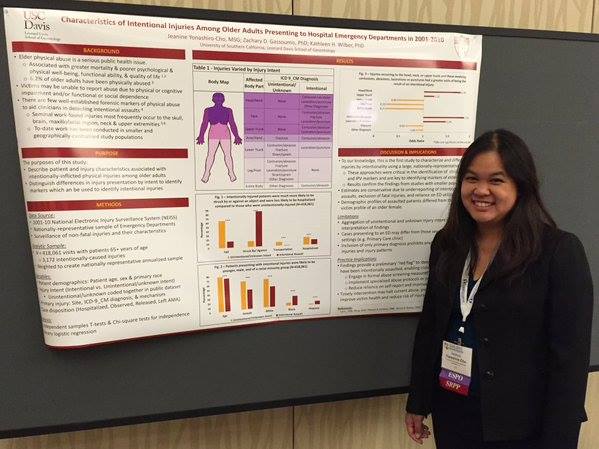The Gerontological Society of America Social Research, Policy, and Practice section recently recognized a USC Leonard Davis School PhD in Gerontology student for research on how health care providers can differentiate intentional injuries from unintentional injuries in older adults when providing emergency care.
Jeanine Yonashiro-Cho’s presentation about her elder abuse research earned the SRPP section’s Outstanding Student Poster award during the GSA Annual Scientific Meeting November 18-22, 2015.
“I’m so honored to be recognized by the SRPP section and so blessed and thankful for to work with Drs. Kathleen Wilber and Zachary Gassoumis,” Yonashiro-Cho said. “I am also very excited for the opportunity to share this research with others who might not otherwise stop to think about elder abuse or neglect.”
Though there is an increasing amount of scientific literature regarding elder abuse, few studies have used population-wide data to examine characteristics of abuse-related injuries seen by health care practitioners. Yonashiro-Cho’s study used 2001-2010 National Electronic Injury Surveillance System data, identifying patient and injury characteristics associated with intentional and unintentional incidents among patients age 65 and older seen in emergency departments.
A few of her findings included increased likelihood of injuries being intentional in men versus women, in younger versus older seniors, and in members of racial or ethnic minorities versus whites. Injuries to the head, face, and upper torso were more likely to be intentionally inflicted than unintentional or of unknown cause, and contusions, abrasions, lacerations, and puncture wounds were also more likely to be associated with intentional injuries versus unintentional or unknown intent.
Yonashiro-Cho said that the need for providers to recognize abuse is stark. The most recent national estimates say one in 10 older adults has experienced abuse within the past year, with over 90% of these cases never being reported to a legal or social services agency, she explained.
“Our research provides some insight that may help practitioners better recognize when an injury might have occurred through abuse, whether or not an older adult ever reports it as abuse,” she said. “This is especially critical in older adult populations because unlike younger victims, elderly victims may be physically or cognitively unable to report the abuse and might otherwise never receive any support or intervention.
Yonashiro-Cho said she plans to continue exploring the issue of elder abuse and hopes to identify additional ways to quickly and accurately recognize abuse and its effects.
“I would love to continue looking at forensic markers of abuse and to continue developing tools which practitioners, family members, and friends can use to assess whether an older adult might have been physically abused or assaulted,” she said. “Additionally, I hope to begin looking at the health consequences of abuse to identify how experiencing an assault might influence the long-term health of older adults.”





